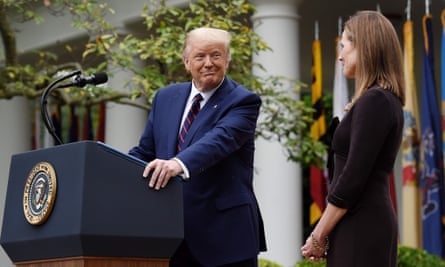Extract from The Guardian
The
US president has been exposed as a businessman whose ventures lost so
much money he ended up paying less tax to the government than his own
working-class supporters.
Last modified on Tue 29 Sep 2020 04.59 AEST
The emperor’s new clothes is a cautionary tale that politicians know well. A vain ruler who cannot resist buying new garments is sold an imaginary new suit. Out on a stroll in this “magical” attire, he is revealed to be naked by a little boy. Hans Christian Andersen’s exercise in groupthink has the emperor, despite the obvious, continuing to claim that he is garbed in finery. It is a subversive message; that power can bend the truth. Donald Trump thinks himself such a ruler.
According to the New York Times, President Trump paid minuscule amounts of federal income tax – $750 in 2016 and 2017, and nothing in 10 of the previous 15 years. That’s because he had a reverse Midas touch with business. Rather than the self-made-billionaire image honed by The Apprentice, Mr Trump excelled at losing, not making, money. Mr Trump’s golf courses have lost $315m since 2000. This time it was the Old Grey Lady, not a child, who showed how Mr Trump was, figuratively, naked.
The president’s reaction was to call the story “totally fake news”. He hopes this language resonates with his base and causes them to identify with him rather than listen to the facts. Mr Trump built a coalition by appealing more to conspiracy theory than to partisanship; and his strategy has been to supply his supporters with conspiracy theories to fight what they see as a conspiracy against them. He lies outrageously and often. His supporters may even appreciate his deceits. Many think all politicians are liars and consider those outraged by Mr Trump’s falsehoods to be hypocrites.
But the New York Times story carries a sting in its long tail. Should Mr Trump win, he is liable for $300m in loans that will come due within four years. “His lenders could be placed,” the paper notes dryly, “in the unprecedented position of weighing whether to foreclose on a sitting president.” Being in hock to foreign entities would surely pose a major security risk. As the story is unfolding, its impact on the most important election in modern US history cannot be easily judged. The news arrived on the eve of the first presidential debate between the Democrats’ Joe Biden and Mr Trump. Mr Biden’s campaign was quick to cast the president as a leader who thought taxes were just for the little people, pointing out that teachers, nurses and firefighters all paid a lot more to the government than Mr Trump does.
America seems broken by Covid-19 after four years of Mr Trump. Almost 30 million are claiming unemployment insurance. Hunger is growing. Two-thirds of households hit by coronavirus face financial hardship. Decades of worshipping greed has destabilised society. The lack of political pressure to compel Congress to extend the $600 per week additional jobless benefit when it expired in July was shocking – especially considering the Republican rush to push through Judge Amy Coney Barrett’s supreme court confirmation hearings. Inequality is a US national emergency. It ought to be addressed by increased taxes on the wealthy. Mr Trump won in 2016 by making promises to voters he was not going to keep. He cheated his working-class supporters, suggesting that many of their fears cannot be of concern. Mr Trump probably believed his own story. One hopes for the US’s sake that come November fewer people will trust him again.
No comments:
Post a Comment